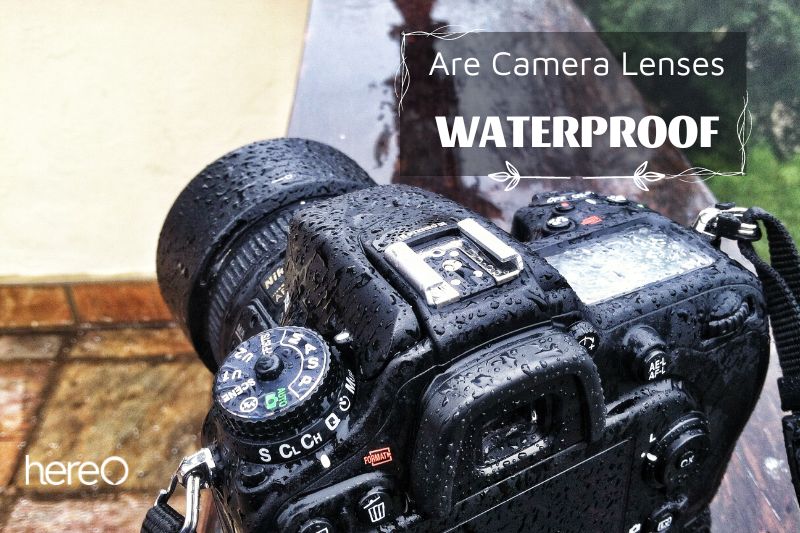Whatever the weather, the goal of photography is to capture the moment. Waterproof and water-resistant camera lenses are essential for photographers who work in harsh locations and underwater. These photographers need to secure their equipment and photos. That raises the question of are camera lenses waterproof?
Contents
- 1 Are Camera Lenses Waterproof?
- 2 What’s the Difference Between Weatherproof and Waterproof Lenses?
- 3 Differences Between Weather Sealed vs. Water-Resistant vs. Waterproof
- 4 How To Tell Your Camera Lenses Are Weather-Sealed?
- 5 How To Keep Your Camera Lenses Dry
- 6 Are Weather-Sealed Lenses Worth It?
- 7 FAQs about Are Camera Lenses Waterproof
- 8 Conclusion
Are Camera Lenses Waterproof?

Most camera lenses are not waterproof, but there are some that are weather-sealed and can withstand some exposure to water. If you are planning on using your camera in wet conditions, it is important to choose a lens that is weather-sealed. Weather-sealed lenses are typically more expensive than non-weather-sealed lenses, but they can be worth the investment if you need to use your camera in wet conditions.
When choosing a weather-sealed lens, it is important to check the specifications to make sure that the lens is rated for the conditions you will be using it in. If you are unsure about which lens to choose, you can always ask a camera store employee for help.
How much water the lenses or camera can withstand is indicated by an IPX rating. Unfortunately, the majority of camera lenses lack an IPX rating, and lens manufacturers frequently leave room for ambiguity regarding waterproofing.
What’s the Difference Between Weatherproof and Waterproof Lenses?
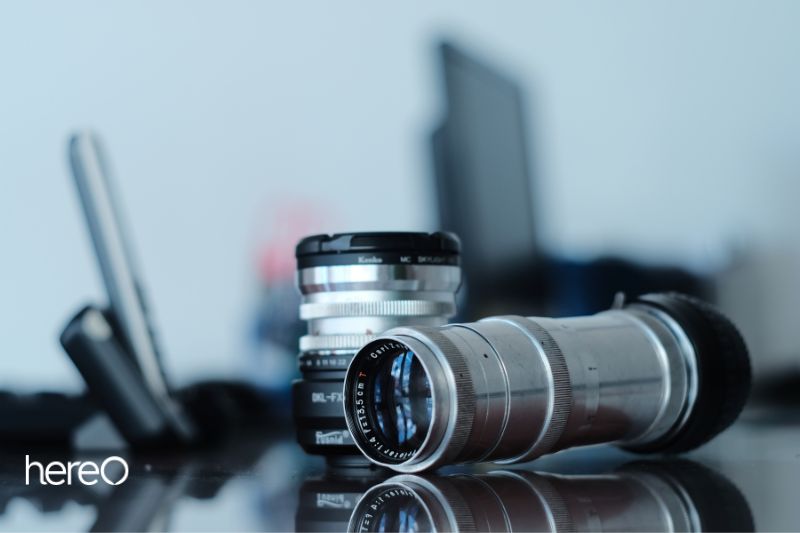
Although purchasing camera lenses seems simple, it could actually be difficult. Some companies may promote that their lenses are waterproof, while others could just say that they are weatherproof. Knowing the differences will help you choose the lenses that are best for you.
Weatherproof lenses are not waterproof because they are not sealed to be submerged in water without suffering damage. Water running off the lens, dust, and other factors are only partially protected by weatherproof lenses. In the rain, these lenses might be usable, but not in the water.
Make sure to get lenses with rubber gaskets and housing to make them waterproof if you plan to take pictures underwater or in harsh weather. Thankfully, electronic controls and stabilization capabilities let you continue using the camera without needing to change the lens while shooting pictures.
Camera lenses are not waterproof even after weather sealing. However, it shields your camera from damaging elements like snow, rain, humidity, and dust. While others can withstand a brief submersion in water, certain lenses incorporate weather sealing that can prevent drips of water from entering the camera.
Differences Between Weather Sealed vs. Water-Resistant vs. Waterproof

It is frequently assumed that the terms weather sealed, water-resistant, and waterproof indicate the same thing. However, when using these terminology to describe their lenses and cameras, manufacturers can be incredibly ambiguous.
Waterproof Lenses Are Made for Water Submersion
Cameras and lenses that are waterproof can be submerged in water. They don’t become wet unless they are defective. However, at some depths, the lenses’ clarity may be diminished. The integrity of the pictures you capture might be preserved with the help of a safe, waterproof casing.
Water-Resistant Lenses Aren’t Fully Waterproof
The amount of waterproofing with water resistant lenses is lower. If water splashes on them or if it drizzles on them, they won’t be damaged. As well as freezing temperatures and snow flakes, the resistance is applicable. You should pay attention to other items, though, like as the battery and memory cards, as they could not be suitable for severe weather.
Weather Sealing Doesn’t Protect From Water Submersion
Water resistance and weather sealing have similar meanings, however rain is the main focus of weather sealing. The phrase “weather sealing” is the most confusing and is frequently used to describe lenses and cameras.
An indication of temperature, dust, or water exposure may be weather sealing. Before choosing which one best meets your photography needs, you must first determine the differences between weather-sealed lenses and cameras.
How To Tell Your Camera Lenses Are Weather-Sealed?
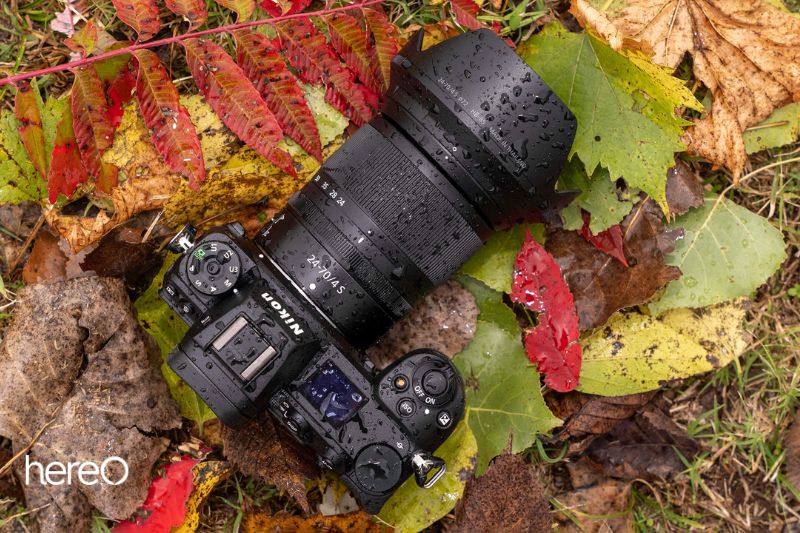
For makers of camera lenses, the term “weather sealing” is ambiguous and frequently refers to various things. Weather sealing is not standardized. Because of this, some manufacturers assert that newer models have improved weather sealing, implying that older models were only partially covered.
When you’re looking for a camera lens that can withstand the elements, there are a few things you can check for to make sure it’s weather-sealed. First, take a look at the lens mount. If there’s a rubber gasket sealing it off, that’s a good sign that the lens is weather-sealed.
Next, check for seals around any buttons or switches on the lens. These seals help keep moisture and debris out of the delicate electronic components.
Finally, see if the lens has a fluorine coating. This coating helps repel water and fingerprints, making it easier to keep your lens clean. You can also check the manufacturer’s website to see if they list the lens as weather-sealed.
How To Keep Your Camera Lenses Dry
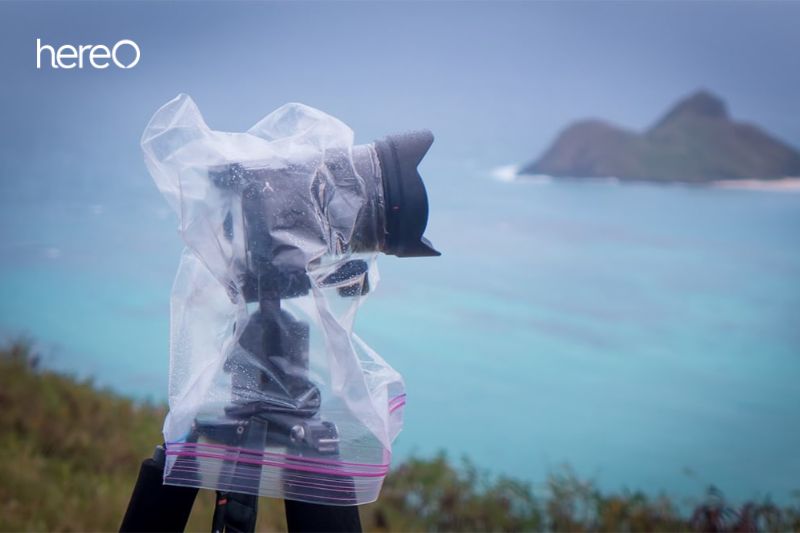
In the rain
Bag:
If your bag isn’t already a waterproof camera bag, consider purchasing one with a built-in rain cover. More crucially, it features a rain cover that you can quickly slip on and fasten with clips. It offers simple access and a degree of stealth.
Even in heavy rain, this works well, but if you plan to spend more time in a rainy environment, you should choose something more waterproof.
Lens Hood:
Raindrops should be kept off the lens for a variety of reasons, one of which is to keep the lens hood on your lens at all times. Although it won’t completely prevent rain from falling on your lens, it will undoubtedly reduce the amount.
A cheap, worn-out shower hat is the best option! If it’s raining, throw it over your camera to shield it momentarily.
There are a few options for photography rain gear if you genuinely plan to shoot in the rain for a significant amount of time. There are inexpensive waterproof camera covers that are disposable.
On the water
Surfing, sailing, and rafting… If you expect water spray to come at the front of the lens or the camera to be submerged at any time (be prepared for the worst! ), you might need something with a little more “waterproofness.” Use one of the rain coverings if that’s not a problem.
A camera will eventually fail in salt water! In salty settings, keeping your camera dry is essential. Consider making a purchase of a genuine watertight and waterproof camera case. For 200-foot dives, you don’t need a $2,000 polycarbonate dSLR watertight case—just something you can at least keep submerged for a short while.
Fighting fogging
Any waterproof camera bag has the potential to fog. To stop this:
- If possible, place your camera in the case in a cold, dry location to avoid introducing moisture.
- During your shot, keep 1 or 2 desiccant packets that have just been charged inside the case.
- Never leave the case in direct sunlight as this can cause the lens to fog and will cause any moisture in the case to condense. If you can, keep it covered with a damp towel.
Storage & Transportation
The presence of salt alone might have negative unseen effects. In these settings, a waterproof camera case or dry bag is essential. If you can locate a dry bag large enough for it, you can still use your regular camera bag.
Additional camera-specific dry bags are available. After removing the padded inner bag, these outer bags can be used as standard dry bags for other items.
These are excellent bags for carrying your gear to and from the boat and for storing it while you’re out on the water or at the beach. You should also use desiccant packs in them, preferably larger ones that can store more moisture.
Are Weather-Sealed Lenses Worth It?
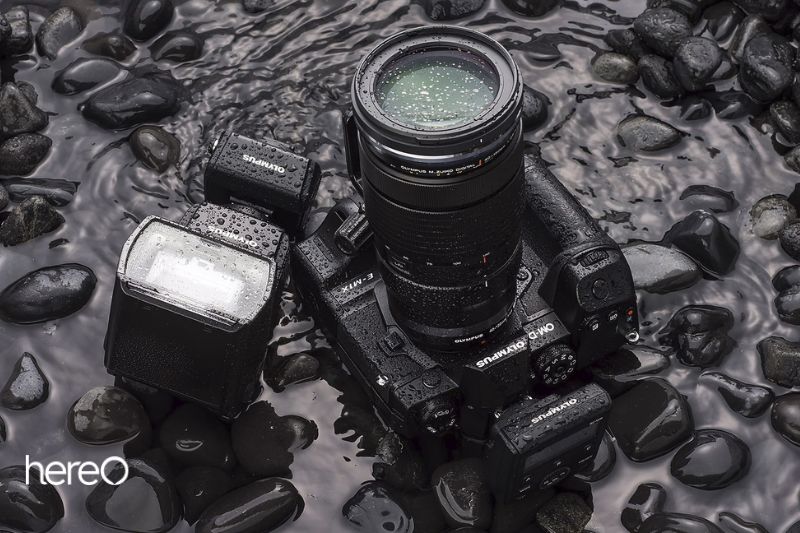
You’ll discover that lenses with weather seals cost more when purchasing. In actuality, all but Pentax’s lenses are high end products. It is normal to wonder whether paying more for the added protection is worthwhile.
If you need them, weather-sealed lenses are valuable. Weather-sealed lenses are worthwhile if you frequently find yourself taking photos in erratic conditions where your camera is at risk of being exposed to dirt, dust, and water. They will safeguard your camera and eventually cost you less money.
But if you buy weather-sealed lenses but never find a use for them, you’ve spent your money on a feature you don’t require. Purchasing better lenses or other camera accessories with the money would have likely been a better use of it.
FAQs about Are Camera Lenses Waterproof
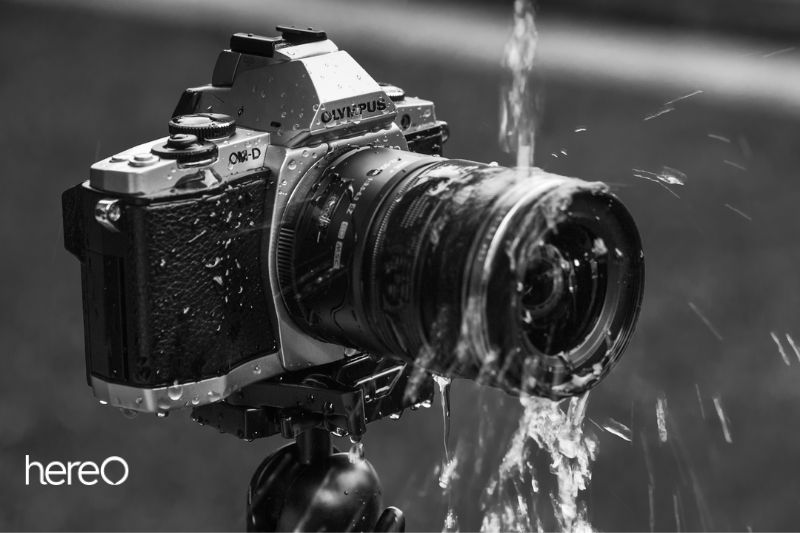
Is there a waterproof mirrorless camera?
Most mirrorless cameras are not waterproof. However, many of them are weather-sealed.
Can a camera lens get wet?
Yes, Your beloved camera can be irreparably harmed by even a small bit of water, but if you act quickly, you might be able to salvage it. Even a small splash in the wrong place on a camera’s delicate internal components and lenses can cause irreparable harm.
Are DSLR lenses waterproof?
Although some DSLR cameras are weather hardened and can survive small raindrops, there is no DSLR camera that is really waterproof, thus you should never take a camera underwater.
Can you take a DSLR to the beach?
If you are careful and take the proper safety measures to protect your camera, you shouldn’t be afraid to take it to the beach or even underwater.
Is it okay to shoot in the rain?
Yes, ensure that your camera is water-tight. For a cheap rain cover, cut a hole in a plastic bag or purchase a quality rain cover for your camera. In any case, since it’s challenging to keep your camera completely dry in the rain, you’ll need to properly dry off your equipment after the session.
Conclusion
If you’re a photographer, make sure you have the right equipment to protect your camera lenses from the elements. Waterproof and water-resistant camera lenses are essential for photographers who work in harsh locations and underwater. With the right gear, you can be sure to capture the perfect moment no matter what the weather throws at you.
Thank you for reading this post. HereOfamily hope you enjoy your reading!
